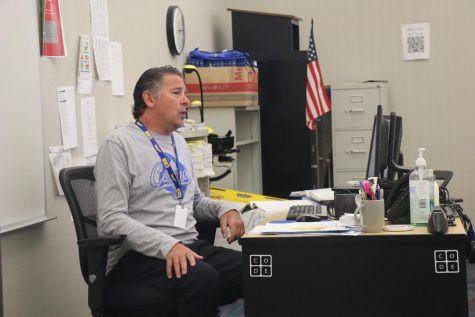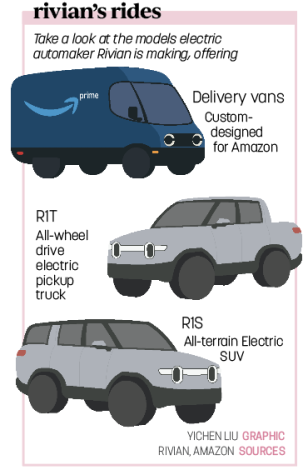Senior Shrithan Sandadi said his family often uses Amazon to purchase their everyday items.

“We use Amazon a lot,” Sandadi said. “It’s really convenient because it gives you all the different options and it’s pretty accessible; it has many different varieties (of products) on there, and it’s a one-stop shop, so you can get anything you really want, and it’s there.”
However, he said he often faces a compromise between sustainability and purchasing what he needs from online retailers like Amazon.
“I realize how much of our current world is invested in fossil fuels and how much time and resources is needed to move toward a green-energy world,” Sandadi said. “I feel like as a whole, people would see it as a favorable initiative (if Amazon implemented more green energy plans).”
Amazon is implementing a plan to have net-zero carbon emissions by 2040, which includes a goal to acquire 100,000 electric delivery vans by 2030. In September of 2020, Amazon announced it would partner with Rivian, a Michigan-based sustainable automobile company, to create its custom electric vehicles in a $700 million deal. This January, Amazon announced another deal with car company Stellantis to use its electric vehicles starting 2023.
According to IB Business Management teacher John Albers, Amazon’s strong influence on the economy is largely responsible for some of the recent changes.
“I do use Amazon and I think it is great that they are taking the lead into this change-over in supply chain logistics,” Albers said via email. “As Amazon continues to grow astronomically, their contribution to helping the environment becomes a bigger force for change…Therefore, as a giant in retail and logistics, all eyes are on them to lead the way. As Amazon leaps into this territory, and shows success, then others will follow and begin to make changes and/or learn from their issues and mistakes.”
Sandadi said he thinks Amazon may have considered both public relations as well as genuine desire for climate reform when making their decision to purchase electric vans.

He said, “There’s always multiple different aspects to every decision that goes into such a big corporation like Amazon, and I definitely think there’s a PR aspect where if you convey this image of a company that’s using green tech, then it’s more favorable toward younger consumers and people as a whole, because you’re developing (means of) change that’s good for the world,” he said. “They can talk (about these promises) for so long, but they actually have to go on their word and perform on their actions. Until we see them actually doing these things that they say they’re going to do, then we can only say that it’s a pledge.”
Curt Hart, a communications manager for the Washington State Department of Ecology, said he agreed both PR relations and internal desire for change are often driving factors in companies’ decisions to enact more climate-aware policies.

“It may be a combination of ‘it’s the right thing to do’ from a public relations standpoint, but it’s also going to be the right thing to do from an economic standpoint,” he said. “It’s a smart thing to make the investment now, because it’s an investment you’re either going to do now or it’ll be an investment down the road that you have to do, and it could be more expensive if you’re a company that doesn’t make these investments now. We would hope that these companies are making these investments knowing two things: it’s good for the environment and it makes good economic sense to get away from fossil fuels.”
Albers said from a business perspective, wide-scale change often begins with a leader in the industry.
“Climate change is an ongoing issue, and if larger companies ignore it and refuse to take any initiatives to contribute, they will be looked upon in a negative light,” Albers said. “So, I think there (are) a lot of external forces driving this change for companies to comply, especially for giants like Amazon to lead the way. This may then drive other giants to follow and then we may see more trickle-down effect from it.”
In the end, Sandadi said he commends Amazon for taking the steps toward sustainability.
“Even if it doesn’t really go that well,” he said, “the fact that they’re putting themselves out there and willing to make a change from the status quo is also really good, because there aren’t many people who are willing to take away from (their own security).”




























![Keep the New Gloves: Fighter Safety Is Non-Negotiable [opinion]](https://hilite.org/wp-content/uploads/2024/12/ufcglovescolumncover-1200x471.png)
















































![Review: “We Live in Time” leaves you wanting more [MUSE]](https://hilite.org/wp-content/uploads/2024/12/IMG_6358.jpg)
![Review: The premise of "Culinary Class Wars" is refreshingly unique and deserving of more attention [MUSE]](https://hilite.org/wp-content/uploads/2024/12/MUSE-class-wars-cover-2.png)
![Introducing: "The Muses Who Stole Christmas," a collection of reviews for you to follow through winter [MUSE]](https://hilite.org/wp-content/uploads/2024/12/winter-muse-4.gif)
![Review: "Meet Me Next Christmas" is a cheesy and predictable watch, but it was worth every minute [MUSE]](https://hilite.org/wp-content/uploads/2024/11/AAAAQVfRG2gwEuLhXTGm3856HuX2MTNs31Ok7fGgIVCoZbyeugVs1F4DZs-DgP0XadTDrnXHlbQo4DerjRXand9H1JKPM06cENmLl2RsINud2DMqIHzpXFS2n4zOkL3dr5m5i0nIVb3Cu3ataT_W2zGeDAJNd_E-1200x884.jpg)
![Review: "Gilmore Girls", the perfect fall show [MUSE]](https://hilite.org/wp-content/uploads/2024/11/gilmore-girls.png)
![Review in Print: Maripaz Villar brings a delightfully unique style to the world of WEBTOON [MUSE]](https://hilite.org/wp-content/uploads/2023/12/maripazcover-1200x960.jpg)
![Review: “The Sword of Kaigen” is a masterpiece [MUSE]](https://hilite.org/wp-content/uploads/2023/11/Screenshot-2023-11-26-201051.png)
![Review: Gateron Oil Kings, great linear switches, okay price [MUSE]](https://hilite.org/wp-content/uploads/2023/11/Screenshot-2023-11-26-200553.png)
![Review: “A Haunting in Venice” is a significant improvement from other Agatha Christie adaptations [MUSE]](https://hilite.org/wp-content/uploads/2023/11/e7ee2938a6d422669771bce6d8088521.jpg)
![Review: A Thanksgiving story from elementary school, still just as interesting [MUSE]](https://hilite.org/wp-content/uploads/2023/11/Screenshot-2023-11-26-195514-987x1200.png)
![Review: "When I Fly Towards You", cute, uplifting youth drama [MUSE]](https://hilite.org/wp-content/uploads/2023/09/When-I-Fly-Towards-You-Chinese-drama.png)
![Postcards from Muse: Hawaii Travel Diary [MUSE]](https://hilite.org/wp-content/uploads/2023/09/My-project-1-1200x1200.jpg)
![Review: "Ladybug & Cat Noir: The Movie," departure from original show [MUSE]](https://hilite.org/wp-content/uploads/2023/09/Ladybug__Cat_Noir_-_The_Movie_poster.jpg)
![Review in Print: "Hidden Love" is the cute, uplifting drama everyone needs [MUSE]](https://hilite.org/wp-content/uploads/2023/09/hiddenlovecover-e1693597208225-1030x1200.png)
![Review in Print: "Heartstopper" is the heartwarming queer romance we all need [MUSE]](https://hilite.org/wp-content/uploads/2023/08/museheartstoppercover-1200x654.png)



